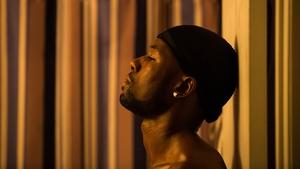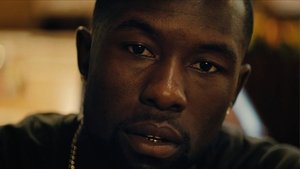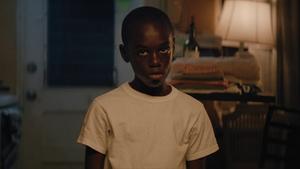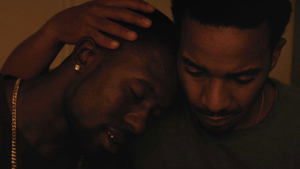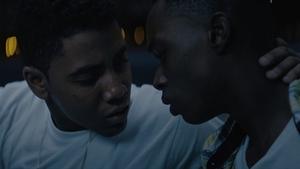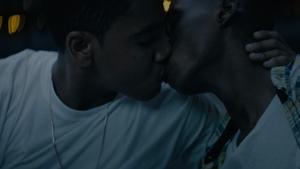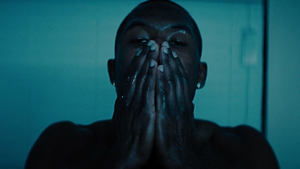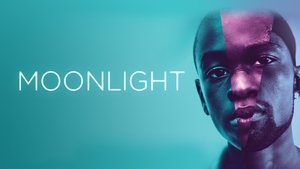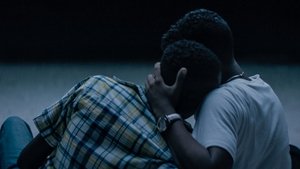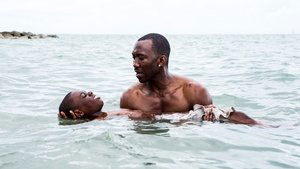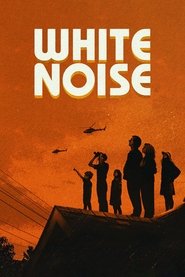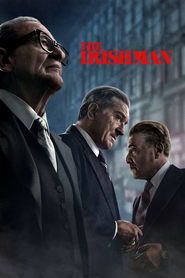There are certain things in this world that just can't be explained. On the surface, Barry Jenkins' profound new feature, Moonlight, focuses on a familiar premise using many unknown actors and actresses, but somehow it manages to transcend the superficial sum of its parts. Being able to pull off that rare feat is nothing to take lightly. And for that reason, Barry Jenkins and his entire collection of writers, actors and crew appear to be in line for a huge awards season run.
Moonlight tells the gripping story of an impoverished youth named Chiron growing up during the heart of "The War on Drugs" in the projects of Miami. Chiron is taken under the wings of a local drug dealer (Mahershala Ali) and his girlfriend (Janelle Monae) while trying to avoid his drug-addicted mother (Naomie Harris). And as Chiron comes into his own, not only is he forced to battle the demons of his home life, he also struggles to come to grips with his sexuality.

Although Moonlight fails to venture into uncharted territory with its premise or story, the film unfolds in a truly mesmerizing manner. Within its partitioned structure, years pass from chapter to chapter bringing about a trio of performers to capture the essence of Chiron. Each are absolutely magnificent is this evolving story of self discovery and personal acceptance, but it's Ashton Sanders who shines brightest. Sanders highlights the middle segment of the film during Chiron's trying teenage years, where he experiences harsh bullying and an unforgettable glimpse into his sexual curiosity. It's a challenging role that's captured brilliantly by the young actor. Other standout performances come from Mahershala Ali, Janelle Monae and Naomie Harris. Ali gives a memorable turn in the opening chapter as Chiron's flawed mentor, while Harris appears in all three parts as the boy's drug-addled mother. Mounting buzz suggests that both Ali and Harris are the most likely to earn Oscar recognition but, make no mistake about it, there's no shortage of impressive acting on display throughout the entirety of Moonlight.

In addition to countless exceptional performances help create an engrossing story, Moonlight possesses flawless pacing and top flight direction. Barry Jenkins delivers a masterful vision that lifts the film from a recognizable tale to a refreshingly original finished product. And although Moonlight's stereotypical portrayal of urban drug addiction is slightly frustrating, it becomes an easily overlooked blemish by the time the third act arrives. In fact, I felt completely caught off guard by the film's final scene, as I could've easily taken another hour of Chiron's captivating journey. Needless to say, the surprising conclusion doesn't feel cheapened at all as the story ends at a meaningful crossroads.
Moonlight is a beautifully poetic expression of artistic collaboration. The film doesn't need to resort to shockingly graphic scenes of homosexuality to make a statement. It's understood that less is more as long as everyone involved goes above and beyond, which they certainly do. Moonlight stands as a transcending indie film packaged wonderfully by Barry Jenkins into a certified and deserving awards season contender.
-
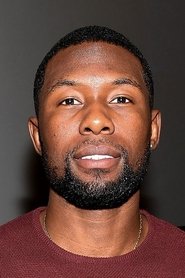 NameTrevante RhodesCharacterBlack
NameTrevante RhodesCharacterBlack -
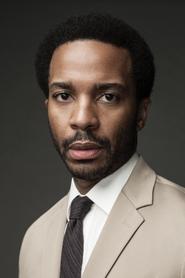 NameAndré HollandCharacterKevin
NameAndré HollandCharacterKevin -
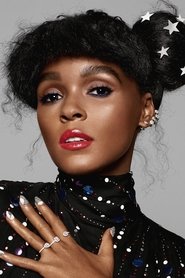 NameJanelle MonáeCharacterTeresa
NameJanelle MonáeCharacterTeresa -
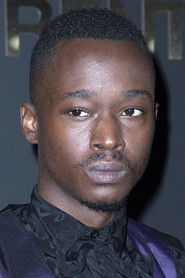 NameAshton SandersCharacterChiron
NameAshton SandersCharacterChiron -
 NameJharrel JeromeCharacterKevin Age 16
NameJharrel JeromeCharacterKevin Age 16 -
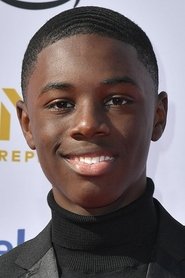 NameAlex R. HibbertCharacterLittle
NameAlex R. HibbertCharacterLittle -
 NameJaden PinerCharacterKevin Age 9
NameJaden PinerCharacterKevin Age 9 -
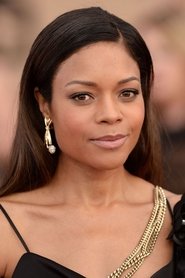 NameNaomie HarrisCharacterPaula
NameNaomie HarrisCharacterPaula -
 NameMahershala AliCharacterJuan
NameMahershala AliCharacterJuan -
 NameShariff EarpCharacterTerrence
NameShariff EarpCharacterTerrence -
 NameDuan SandersonCharacterAzu
NameDuan SandersonCharacterAzu -
 NameHerman 'Caheei McGlounCharacterLongshoreman
NameHerman 'Caheei McGlounCharacterLongshoreman -
 NameKamal Ani-BellowCharacterPortable Boy 1
NameKamal Ani-BellowCharacterPortable Boy 1 -
 NameKeomi GivensCharacterPortable Boy 2
NameKeomi GivensCharacterPortable Boy 2 -
 NameEddie BlanchardCharacterPortable Boy 3
NameEddie BlanchardCharacterPortable Boy 3 -
 NameRudi GoblenCharacterGee
NameRudi GoblenCharacterGee -
 NameEdson JeanCharacterMr. Pierce
NameEdson JeanCharacterMr. Pierce -
 NamePatrick DecileCharacterTerrel
NamePatrick DecileCharacterTerrel -
 NameHerveline MoncionCharacterSamantha
NameHerveline MoncionCharacterSamantha -
 NameFransley HyppoliteCharacterPizzo
NameFransley HyppoliteCharacterPizzo -
 NameJesus MitchellCharacterOld School Guard
NameJesus MitchellCharacterOld School Guard -
 NameLarry AndersonCharacterAntwon
NameLarry AndersonCharacterAntwon -
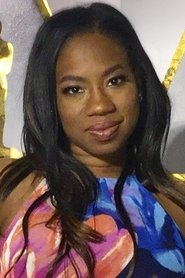 NameTanisha CidelCharacterPrincipal Williams
NameTanisha CidelCharacterPrincipal Williams -
 NameStephon BronCharacterTravis
NameStephon BronCharacterTravis -
 NameDon SewardCharacterTip
NameDon SewardCharacterTip -
 NameJustin EbenhackCharacterGang Member (uncredited)
NameJustin EbenhackCharacterGang Member (uncredited)
-
 NameBarry JenkinsJobDirector
NameBarry JenkinsJobDirector -
 NameNicholas BritellJobOriginal Music Composer
NameNicholas BritellJobOriginal Music Composer -
 NameDirk GreeneJobVFX Artist
NameDirk GreeneJobVFX Artist -
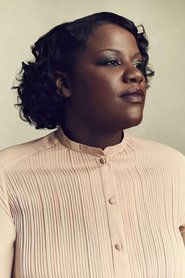 NameJoi McMillonJobEditor
NameJoi McMillonJobEditor -
 NameYesi RamirezJobCasting
NameYesi RamirezJobCasting -
 NameJames LaxtonJobDirector of Photography
NameJames LaxtonJobDirector of Photography -
 NameNat SandersJobEditor
NameNat SandersJobEditor -
 NameDoniella DavyJobMakeup Department Head
NameDoniella DavyJobMakeup Department Head -
 NameMabel BarbaJobArt Direction
NameMabel BarbaJobArt Direction -
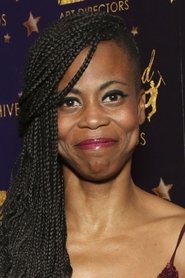 NameHannah BeachlerJobProduction Design
NameHannah BeachlerJobProduction Design -
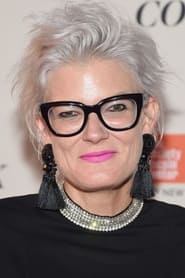 NameCaroline EselinJobCostume Design
NameCaroline EselinJobCostume Design -
 NameJennifer RadzikowskiJobUnit Production Manager
NameJennifer RadzikowskiJobUnit Production Manager -
 NameAdele RomanskiJobProducer
NameAdele RomanskiJobProducer -
 NameBarry JenkinsJobScreenplay
NameBarry JenkinsJobScreenplay -
 NameJeremy KleinerJobProducer
NameJeremy KleinerJobProducer -
 NameDede GardnerJobProducer
NameDede GardnerJobProducer -
 NameSarah EsbergJobExecutive Producer
NameSarah EsbergJobExecutive Producer -
 NameTarell Alvin McCraneyJobExecutive Producer
NameTarell Alvin McCraneyJobExecutive Producer -
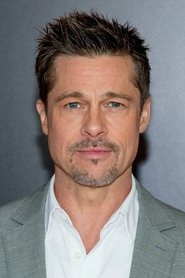 NameBrad PittJobExecutive Producer
NameBrad PittJobExecutive Producer -
 NameElayne Schneiderman SchmidtJobLine Producer
NameElayne Schneiderman SchmidtJobLine Producer -
 NameGianna SparacinoJobHair Department Head
NameGianna SparacinoJobHair Department Head -
 NameRyan CrowleyJobLeadman
NameRyan CrowleyJobLeadman -
 NameJoshua AdenijiJobSupervising Sound Editor
NameJoshua AdenijiJobSupervising Sound Editor -
 NameFrederick HowardJobSound Effects Editor
NameFrederick HowardJobSound Effects Editor -
 NameAlex EdlinJobStunt Coordinator
NameAlex EdlinJobStunt Coordinator -
 NameAndrew HeviaJobCo-Producer
NameAndrew HeviaJobCo-Producer -
 NameVeronica NickelJobLine Producer
NameVeronica NickelJobLine Producer -
 NameRoger MendozaJobSecond Assistant Director
NameRoger MendozaJobSecond Assistant Director -
 NameChristopher BonisJobSound Effects Editor
NameChristopher BonisJobSound Effects Editor -
 NamePedro M. GuillenJobProduction Coordinator
NamePedro M. GuillenJobProduction Coordinator -
 NameAndres Des RochersJobThanks
NameAndres Des RochersJobThanks -
 NameRobert CrowleyJobLeadman
NameRobert CrowleyJobLeadman -
 NameOnnalee BlankJobSound Re-Recording Mixer
NameOnnalee BlankJobSound Re-Recording Mixer -
 NameJohn MontagueJobAssociate Producer
NameJohn MontagueJobAssociate Producer -
 NameRyan BrileyJobDialogue Editor
NameRyan BrileyJobDialogue Editor -
 NameBenjamin GieschenJobFoley Editor
NameBenjamin GieschenJobFoley Editor -
 NameJames BaldanzaJobSteadycam
NameJames BaldanzaJobSteadycam -
 NameLibor CevelikJobSteadicam Operator
NameLibor CevelikJobSteadicam Operator -
 NameAnthony SchraderJobKey Grip
NameAnthony SchraderJobKey Grip -
 NameJean DaguillardJobGrip
NameJean DaguillardJobGrip -
 NameMaggie PhillipsJobMusic Supervisor
NameMaggie PhillipsJobMusic Supervisor -
 NameJustin SimienJobThanks
NameJustin SimienJobThanks -
 NameStephen P. Del PreteJobFirst Assistant Director
NameStephen P. Del PreteJobFirst Assistant Director -
 NameJoseph B. DareJobCamera Operator
NameJoseph B. DareJobCamera Operator -
 NameJeremy KoenigJobLeadman
NameJeremy KoenigJobLeadman -
 NameJulio AlvarezJobBoom Operator
NameJulio AlvarezJobBoom Operator -
 NameArtie MalesciJobStunt Coordinator
NameArtie MalesciJobStunt Coordinator -
 NameKiva KnightJobGaffer
NameKiva KnightJobGaffer -
 NameDavid LanesJobKey Grip
NameDavid LanesJobKey Grip -
 NameAlessandro CheccacciJobSound Re-Recording Mixer
NameAlessandro CheccacciJobSound Re-Recording Mixer -
 NameStéphane RenardJobFirst Assistant Camera
NameStéphane RenardJobFirst Assistant Camera -
 NameOsvaldo Silvera Jr.JobSteadicam Operator
NameOsvaldo Silvera Jr.JobSteadicam Operator -
 NameRyan CooglerJobThanks
NameRyan CooglerJobThanks -
 NameJay Van HoyJobThanks
NameJay Van HoyJobThanks -
 NameRegina McLarneyJobSet Decoration
NameRegina McLarneyJobSet Decoration -
 NameChris DavidJobSound Re-Recording Mixer
NameChris DavidJobSound Re-Recording Mixer -
 NameRyan BrileyJobADR Editor
NameRyan BrileyJobADR Editor -
 NameLaura PintoJobScript Supervisor
NameLaura PintoJobScript Supervisor -
 NameNate Grady-ReitanJobAssistant Sound Editor
NameNate Grady-ReitanJobAssistant Sound Editor -
 NameRuben MalaretJobPublicist
NameRuben MalaretJobPublicist -
 NameJames ParnellJobAssistant Sound Editor
NameJames ParnellJobAssistant Sound Editor -
 NameAdam RobackJobElectrician
NameAdam RobackJobElectrician -
 NameDaniel WilliamsJobGrip
NameDaniel WilliamsJobGrip -
 NameKeisha Rae WitherspoonJobLocation Scout
NameKeisha Rae WitherspoonJobLocation Scout -
 NameThomas VicariJobScoring Mixer
NameThomas VicariJobScoring Mixer -
 NameMelinda TaksenJobScript Supervisor
NameMelinda TaksenJobScript Supervisor -
 NameMathew WatersJobSound Re-Recording Mixer
NameMathew WatersJobSound Re-Recording Mixer -
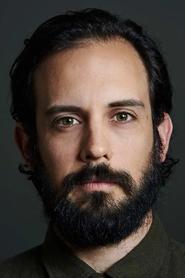 NameSebastian PardoJobTitle Designer
NameSebastian PardoJobTitle Designer -
 NameVeronica NickelJobCo-Producer
NameVeronica NickelJobCo-Producer -
 NameBecca KenyonJobProperty Master
NameBecca KenyonJobProperty Master -
 NameChris GilesJobSound Mixer
NameChris GilesJobSound Mixer -
 NameMorgan KellumJobThanks
NameMorgan KellumJobThanks -
 NameFernando RodriguezJobWardrobe Supervisor
NameFernando RodriguezJobWardrobe Supervisor -
 NameRod DealJobLocation Scout
NameRod DealJobLocation Scout -
 NameDeby StewartJobStudio Teachers
NameDeby StewartJobStudio Teachers -
 NameMicah GreenJobThanks
NameMicah GreenJobThanks -
 NameGiovanni RodriguezJobGrip
NameGiovanni RodriguezJobGrip -
 NameAnna BodenJobThanks
NameAnna BodenJobThanks -
 NameAmy SeimetzJobThanks
NameAmy SeimetzJobThanks -
 NameTim FainJobMusician
NameTim FainJobMusician -
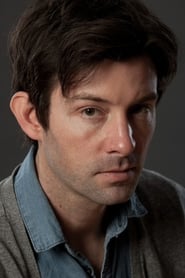 NameShane CarruthJobThanks
NameShane CarruthJobThanks -
 NameFabricio SackniesJobGrip
NameFabricio SackniesJobGrip -
 NameFaren HumesJobLocation Manager
NameFaren HumesJobLocation Manager -
 NameCarolyn GoversJobThanks
NameCarolyn GoversJobThanks -
 NameGraham LeggatJobThanks
NameGraham LeggatJobThanks -
 NameMarco Antonio MartinezJobThanks
NameMarco Antonio MartinezJobThanks -
 NameLeslie ShatzJobThanks
NameLeslie ShatzJobThanks -
 NameTarell Alvin McCraneyJobStory
NameTarell Alvin McCraneyJobStory -
 NameAlex BickelJobDigital Intermediate Colorist
NameAlex BickelJobDigital Intermediate Colorist
-
Trailer
-
Trailer
-
Trailer
-
Clip
-
Clip
-
Clip
-
Clip
-
Clip
-
Clip
-
Clip
-
Teaser
-
Teaser
-
Teaser
-
Teaser
-
Teaser
-
Teaser
-
Teaser
-
Teaser
-
Teaser
-
Featurette
-
Featurette
-
Featurette
-
Featurette
-
Featurette
-
Featurette
-
Featurette
-
Featurette
-
Featurette
-
Featurette
-
Featurette
-
Featurette
-
Featurette
-
Featurette
-
Featurette
-
Featurette
-
Featurette
-
Featurette
-
Featurette
-
Featurette
-
Featurette
-
Featurette
-
Featurette
-
Featurette
-
Featurette
-
Featurette
-
Featurette
-
Featurette
-
Featurette







